英语中情态动词can和could的用法及例句
情态动词can与could用法归纳
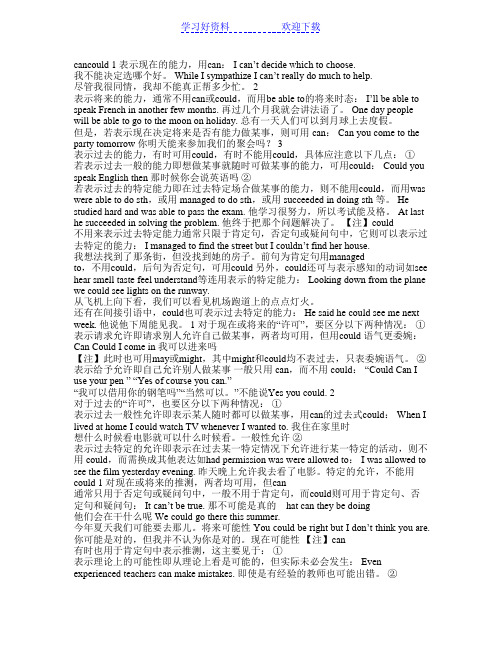
cancould 1 表示现在的能力,用can: I can’t decide which to choose.我不能决定选哪个好。
While I sympathize I can’t really do much to help.尽管我很同情,我却不能真正帮多少忙。
2表示将来的能力,通常不用can或could,而用be able to的将来时态: I’ll be able to speak French in another few months. 再过几个月我就会讲法语了。
One day people will be able to go to the moon on holiday. 总有一天人们可以到月球上去度假。
但是,若表示现在决定将来是否有能力做某事,则可用 can: Can you come to the party tomorrow 你明天能来参加我们的聚会吗? 3表示过去的能力,有时可用could,有时不能用could,具体应注意以下几点:①若表示过去一般的能力即想做某事就随时可做某事的能力,可用could: Could you speak English then 那时候你会说英语吗②若表示过去的特定能力即在过去特定场合做某事的能力,则不能用could,而用was were able to do sth,或用 managed to do sth,或用 succeeded in doing sth 等。
He studied hard and was able to pass the exam. 他学习很努力,所以考试能及格。
At last he succeeded in solving the problem. 他终于把那个问题解决了。
【注】could不用来表示过去特定能力通常只限于肯定句,否定句或疑问句中,它则可以表示过去特定的能力: I managed to find the street but I couldn’t find her house.我想法找到了那条街,但没找到她的房子。
can与could的用法详解及情态动词有关习题

c a n与c o u l d的用法详解及情态动词有关习题Company Document number:WTUT-WT88Y-W8BBGB-BWYTT-19998can与could的用法详解一、表示能力(1)表示现在的能力,用can:My sister can drive. 我妹妹会开车。
Everyone here can speak English. 这儿人人会说英语。
(2)表示将来的能力,通常不用can或could,而用be able to的将来时态:I’ll be able to speak French in another few months. 再过几个月我就会讲法语了。
One day people will be able to go to the moon on holiday. 总有一天人们可以到月球上去度假。
但是,若表示现在决定将来是否有能力做某事,则可用 can:Can you come to the party tomorrow 你明天能来参加我们的聚会吗(3)表示过去的能力,有时可用could,有时不能用could,具体应注意以下几点:①若表示过去一般的能力(即想做某事就随时可做某事的能力),可用could:Could you speak English then 那时候你会说英语吗②若表示过去的特定能力(即在过去特定场合做某事的能力),则不能用could,而用w as (were) able to do sth,或用 managed to do sth,或用 succeeded in doing sth 等。
He studied hard and was able to pass the exam. 他学习很努力,所以考试能及格。
At last he succeeded in solving the problem. 他终于把那个问题解决了。
【注】could 不用来表示过去特定能力通常只限于肯定句,否定句或疑问句中,它则可以表示过去特定的能力:I managed to find the street, but I couldn’t find her house. 我想法找到了那条街,但没找到她的房子。
初中英语语法情态动词can与could用法“三要点”
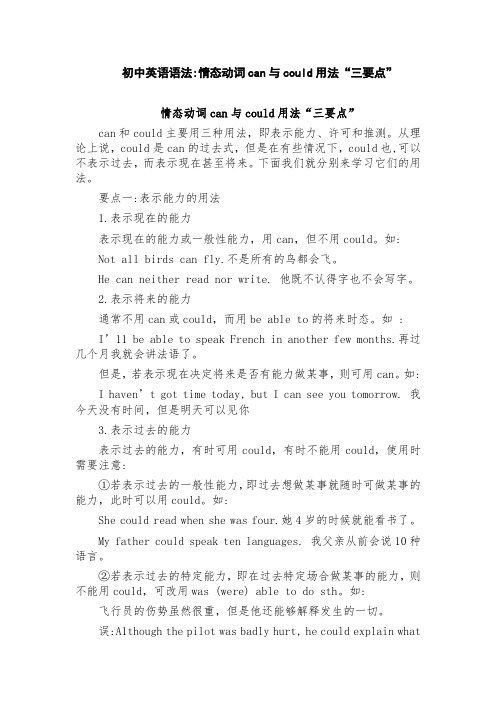
初中英语语法:情态动词can与could用法“三要点”情态动词can与could用法“三要点”can和could主要用三种用法,即表示能力、许可和推测。
从理论上说,could是can的过去式,但是在有些情况下,could也,可以不表示过去,而表示现在甚至将来。
下面我们就分别来学习它们的用法。
要点一:表示能力的用法1.表示现在的能力表示现在的能力或一般性能力,用can,但不用could。
如:Not all birds can fly.不是所有的鸟都会飞。
He can neither read nor write. 他既不认得字也不会写字。
2.表示将来的能力通常不用can或could,而用be able to的将来时态。
如 :I’11 be able to speak French in another few months.再过几个月我就会讲法语了。
但是,若表示现在决定将来是否有能力做某事,则可用can。
如:I haven’t got time today, but I can see you tomorrow. 我今天没有时间,但是明天可以见你3.表示过去的能力表示过去的能力,有时可用could,有时不能用could,使用时需要注意:①若表示过去的一般性能力,即过去想做某事就随时可做某事的能力,此时可以用could。
如:She could read when she was four.她4岁的时候就能看书了。
My father could speak ten languages. 我父亲从前会说10种语言。
②若表示过去的特定能力,即在过去特定场合做某事的能力,则不能用could,可改用was (were) able to do sth。
如:飞行员的伤势虽然很重,但是他还能够解释发生的一切。
误:A1though the pilot was badly hurt, he could explain whathad happened正:Although the pilot was badly hurt, he was able to explain what had happened.句中说的“能够”解释当时所发生的一切,显然是过去特定场合所具有的能力,所以不能用could。
情态动词can和could的用法
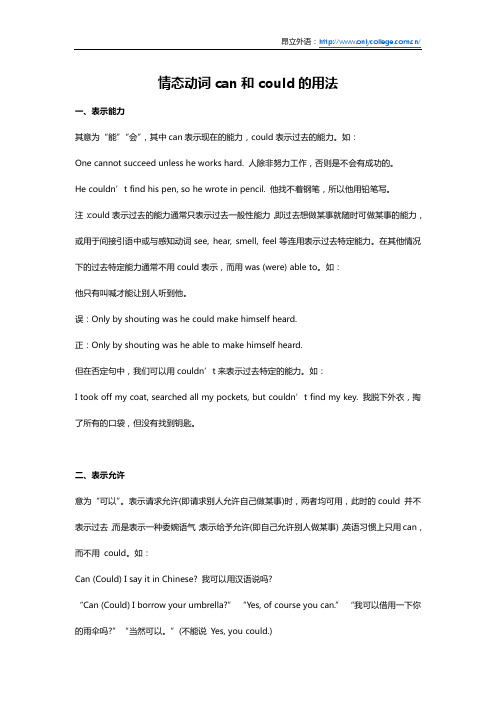
情态动词can和could的用法一、表示能力其意为“能”“会”,其中can表示现在的能力,could表示过去的能力。
如:One cannot succeed unless he works hard. 人除非努力工作,否则是不会有成功的。
He couldn’t find his pen, so he wrote in pencil. 他找不着钢笔,所以他用铅笔写。
注:could表示过去的能力通常只表示过去一般性能力,即过去想做某事就随时可做某事的能力,或用于间接引语中或与感知动词see, hear, smell, feel等连用表示过去特定能力。
在其他情况下的过去特定能力通常不用could表示,而用was (were) able to。
如:他只有叫喊才能让别人听到他。
误:Only by shouting was he could make himself heard.正:Only by shouting was he able to make himself heard.但在否定句中,我们可以用couldn’t来表示过去特定的能力。
如:I took off my coat, searched all my pockets, but couldn’t find my key. 我脱下外衣,掏了所有的口袋,但没有找到钥匙。
二、表示允许意为“可以”。
表示请求允许(即请求别人允许自己做某事)时,两者均可用,此时的could 并不表示过去,而是表示一种委婉语气;表示给予允许(即自己允许别人做某事),英语习惯上只用can,而不用could。
如:Can (Could) I say it in Chinese? 我可以用汉语说吗?“Can (Could) I borrow your umbrella?” “Yes, of course you can.” “我可以借用一下你的雨伞吗?”“当然可以。
”(不能说Yes, you could.)注:以上说的是针对现在或将来情况而言的,若谈的是过去情况,则过去could只用于表示过去一般性允许(即表示某人随时都可以做某事),而不表示特定的允许(即表示在过去某一特定情况下允许进行某一特定的活动),遇此情况需换成其他表达。
语法中的情态动词的用法与区别

语法中的情态动词的用法与区别在英语语法中,情态动词是一类特殊的动词,用于表示说话人对动作、状态或事件的态度、意愿、能力、推测等。
常见的情态动词包括can, could, may, might, shall, should, will, would, must等。
它们有着独特的用法和区别,下面我们将详细讨论。
一、can和could的用法与区别1. can用于表示能力、许可、可能性等,could则表示对过去的推测、委婉的请求或建议等。
例:- He can speak three languages fluently.(他能说三种语言流利。
)- Could you please pass me the salt?(请你递给我盐好吗?)2. can用于表示一般的能力,而could则用于表示过去的具体能力。
例:- When I was young, I could jump very high.(我小时候能跳得很高。
)3. can用于表示可能性、推测,而could则表示可能性更小。
例:- She can be at home.(她可能在家。
)- She could be at home, but I'm not sure.(她可能在家,但我不确定。
)二、may和might的用法与区别1. may用于表示允许、可能性,might则表示较小的可能性。
例:- You may leave the party if you like.(如果你愿意,你可以离开派对。
)- It might rain later.(可能会下雨。
)2. may用于表示请求或征求对方的意见,might则表示更委婉的请求。
例:- May I borrow your pen?(我可以借一下你的笔吗?)- Might I ask for your assistance?(我可以请教你帮忙吗?)三、shall和should的用法与区别1. shall用于表示将来的意愿、命令或承诺,should则表示建议或责任。
can与could的用法详解及情态动词有关习题
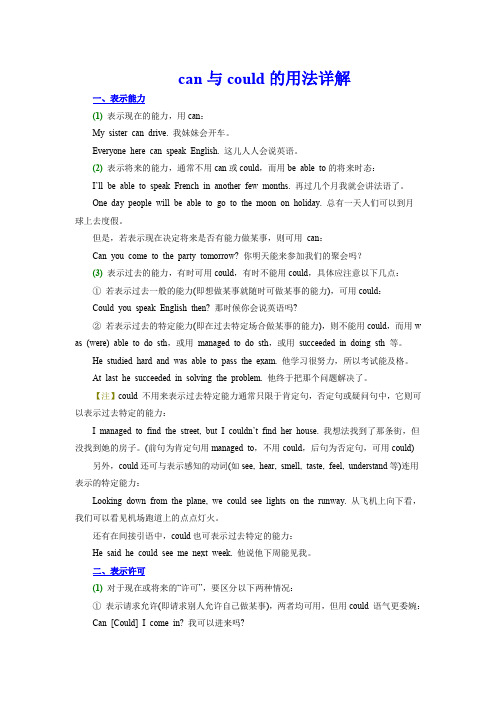
can与could的用法详解一、表示能力(1)表示现在的能力,用can:My sister can drive. 我妹妹会开车。
Everyone here can speak English. 这儿人人会说英语。
(2)表示将来的能力,通常不用can或could,而用be able to的将来时态:I’ll be able to speak French in another few months. 再过几个月我就会讲法语了。
One day people will be able to go to the moon on holiday. 总有一天人们可以到月球上去度假。
但是,若表示现在决定将来是否有能力做某事,则可用can:Can you come to the party tomorrow? 你明天能来参加我们的聚会吗?(3)表示过去的能力,有时可用could,有时不能用could,具体应注意以下几点:①若表示过去一般的能力(即想做某事就随时可做某事的能力),可用could:Could you speak English then? 那时候你会说英语吗?②若表示过去的特定能力(即在过去特定场合做某事的能力),则不能用could,而用w as (were) able to do sth,或用managed to do sth,或用succeeded in doing sth 等。
He studied hard and was able to pass the exam. 他学习很努力,所以考试能及格。
At last he succeeded in solving the problem. 他终于把那个问题解决了。
【注】could 不用来表示过去特定能力通常只限于肯定句,否定句或疑问句中,它则可以表示过去特定的能力:I managed to find the street, but I couldn’t find her house. 我想法找到了那条街,但没找到她的房子。
情态动词can和could的用法区别

情态动词can和could的用法区别一、情态动词can的用法1. 表示能力,意思是:能,会。
如:I can't swim. 我不会游泳。
Can you drive你会开车吗2. 表示客观可能性,意思是:可以,可能。
如:That big cinema can seat 2,000 people.那家大电影院能坐2000人。
He can be very friendly at times.有时他会很友好。
3. 表示允许(和may意思相近),意思是:可以,能够。
如:You can have the book when I have finished it. 书我看完了可以给你。
Can I use your pen 我可以用你的钢笔吗4. 表示惊异、不相信等(用于疑问句、否定句或感叹句中),意思是:会,可能。
如:This can't be true. 这不可能是真的。
Can it be true 这可能是真的吗二、情态动词could的用法1. 表示“能力”或“可能性”,作为can的过去形式。
如:Could you speak English then 那时你能讲英语吗He said he couldn't follow me.他说他跟不上我。
2. 表示惊异、怀疑、不相信等情绪。
如:Who could have taken them 谁会把它们拿走了呢She couldn't have left so soon. 她不可能这么快就走了。
在这种情况下,could和can是可以换用的,用could时口气较缓和,用can时不相信的程度更强一些,两者在时间上没有差别。
3. 比较委婉客气地提出问题或陈述看法。
如:—Could you let me have your passport—Yes, here it is.—看看你的护照好吗—行,这就是。
I could come earlier, if necessary. 如果必要我可以早点来。
情态动词的用法及常见句型总结
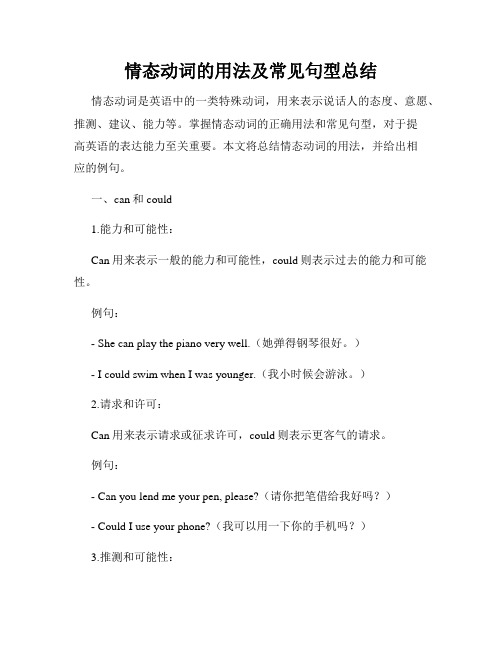
情态动词的用法及常见句型总结情态动词是英语中的一类特殊动词,用来表示说话人的态度、意愿、推测、建议、能力等。
掌握情态动词的正确用法和常见句型,对于提高英语的表达能力至关重要。
本文将总结情态动词的用法,并给出相应的例句。
一、can和could1.能力和可能性:Can用来表示一般的能力和可能性,could则表示过去的能力和可能性。
例句:- She can play the piano very well.(她弹得钢琴很好。
)- I could swim when I was younger.(我小时候会游泳。
)2.请求和许可:Can用来表示请求或征求许可,could则表示更客气的请求。
例句:- Can you lend me your pen, please?(请你把笔借给我好吗?)- Could I use your phone?(我可以用一下你的手机吗?)3.推测和可能性:Can用来表示对现在情况的推测,could则表示对过去或将来情况的推测。
例句:- He can't be at home now.(他现在不可能在家。
)- She could be late for the meeting.(她可能会迟到会议。
)二、may和might1.可能性和许可:May和might都用来表示可能性,表示较大的不确定性,也可用来征求许可。
例句:- It may rain tomorrow.(明天可能会下雨。
)- Might I borrow your umbrella?(我可以借你的伞吗?)2.推测和推测的反问:May和might还可用来表示对现在或将来情况的推测,也可用于反问句。
例句:- He may know the answer.(他可能知道答案。
)- Might I ask you a question?(我可以问你个问题吗?)三、shall和should1.意愿和建议:Shall常用于第一人称,表示意愿、提议或询问行程,should用于其他人称,表示建议或劝告。
- 1、下载文档前请自行甄别文档内容的完整性,平台不提供额外的编辑、内容补充、找答案等附加服务。
- 2、"仅部分预览"的文档,不可在线预览部分如存在完整性等问题,可反馈申请退款(可完整预览的文档不适用该条件!)。
- 3、如文档侵犯您的权益,请联系客服反馈,我们会尽快为您处理(人工客服工作时间:9:00-18:30)。
英语中情态动词can和could的用法及例句I.情态动词can可以用来:
1.表示“能够”:
Two eyes can see more than one.
两只眼睛比一只眼睛看得清楚。
(谚)
Can you say this in English?
你能用英文表达这个意思吗?
I’m sorry I can’t help you.
戏不起我没有能力帮助你。
2.表示“可能”,“可以”:
You can sit here.
你可以坐这里。
We can come over to fetch you.
我们可以过来接你。
Can I come in?
我可以进来吗?
3.(用在疑问及否定句中)表示惊异不可能等(后面有时可跟完成及进行形式):
She can’t be serious.
她不可能是当真的。
How call you be so silly?
你怎么这样傻?
Where can he have gone?
他能到哪里去了呢?
What can she be doing now?
她现在能在干什么呢?
II.情态动词could可以用来表示:
1)能够:
Nobody conld answer that question.
没人能回答那个问题。
It was so dark,we couldn’t see anything.
天那样黑我们什么也看不见。
2)可能,可以:
He said he couldn’t come.
他说他不能来。
I said we could go by boat.
我说我们可以坐船去。
2.可以用来代替can,比较委婉地提出请求用法等(a)或是表示惊异不相信等(b):
a.Could you do me a favor?
你能帮我一个忙吗?
We could send the parcel by air mail.
这包裹可以航空寄去。
b.How could he be so rude?
他怎么这样粗鲁无礼?
They couldn’t have left so soon.
他们不可能走得这么早。
此外could还可用在条件句中,表示假想的情况:I would help you if I could.
我要是能够是会帮助你的。
If you tried you could do the work.
如果你试试,你是可以做这工作的。
